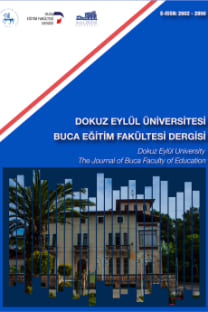YÜKSEK ÖĞRETİMDE ETKİN ÖĞRETİM ARAYIŞI
Genelde yüksek öğretimin “öğretim”, ”araştırma” ve “toplum hizmeti” şeklinde üçlü bir misyonu bulunduğu bilinmektedir. Özellikle Sanayi Devrimi‟nden bu yana, teknolojideki hızlı gelişmelerde sosyal ve endüstriyel yaşamdaki değişiklerin yüksek öğretim misyonu üzerinde köklü etkilere yol açtığı görülmektedir. Son eğilimler, yüksek öğretimin bilişsel dünyasında bir tür disiplinlerarası esnekliği vurgulamakta ve genel eğitsel amaçlardan genel transfer edilebilir becerilere yönelişi işaret etmektedir. Öte yandan, üniversitelerde eğitim-öğretim hizmeti sunan öğretim elemanlarının çoğunlukla bilişsel ve eğitim psikolojisindeki gelişmelerden haberdar olmadıkları görülmektedir. Bu çalışmanın amacı, yüksek öğretimi “yüksek” yapan özellikler, öğretim elemanlarına eğitsel yardım sağlamanın nedenleri, aktif ve işbirlikli öğrenme ve eğitim-öğretim etkinliklerinde bireysel öğrenme stillerinin dikkate alınması açısından yüksek öğretimde eğitim-öğretimi geliştirme yollarını tartişmaktır. Ayrıca, DEU Denizcilik Fakültesi‟nde son günlerde yapılan “bireysel öğrenme stilleri” konulu denizcilik eğitiminde öncü bir araştırmanın sonuçları da özetlenmektedir. Bu çalışmanın, yüksek öğretimde bilişsel ve eğitim psikolojisince önerilen bireysel öğrenme stilleriyle işbirlikli aktif öğrenme yöntemlerinden daha çok yararlanmanın önemine dikkat çekmesi umulmaktadır.
Anahtar Kelimeler:
Yüksek öğretim, son eğilimler, işbirlikli / aktiföğrenme, bireysel öğrenme stilleri
RECENT TRENDS AT HIGHER EDUCATION EMPHASIZING ACTIVE COOPERATIVE LEARNING METHODS INVOLVING INDIVIDUAL LEARNING STYLES
“Higher education”, in general, is known to have a three-legged mission: “teaching”, “research”, and “community service”. Particularly since the Industrial Revolution, the rapid developments in technological movements and the noticeably frequent changes in social and industrial life seem to have brought about fundamental impacts on the mission of higher education. The recent trends have emphasized a kind of interdisciplinary flexibility in the cognitive world of higher education and eventually imposed a shift from theory to practice, from specific to general, from subject-based to vocation-based and from general educational aims to general transferable skills. On the other hand, those who teach at universities are mostly unaware of the developments in the literature of cognitive and educational psychology. The purpose of this study is to discuss how to improve teaching at higher education considering what makes higher education “higher”; why educational aid for academicians, why active and cooperative learning, and how to involve individual learning styles. It also includes the results of a survey, pioneering research on “individual learning styles” at maritime education, conducted quite recently at Dokuz Eylul University Maritime Faculty. This study is hoped to shine a light on the importance of making better use of individual learning styles and active cooperative learning offered by cognitive and educational psychology.
___
- Barkley, E. F., Cross, K. P., and Major, C. H. (2005). Collaborative Learning Techniques, Jossey-Balls, San Francisco, USA
- Barnett, R. (1992). Improving Higher Education: Total Quality Care, The Society for Research into Higher Education and Open University Press, Bristol, England
- Brown G. and Atkins M. (1994). Effective Teaching in Higher Education, British Library Cataloguing, Routledge, London, England
- Cardellini, L.(2002). An Interview with Richard M. Felder, Journal of Science Education, 3(2), 62-65
- Duke, C. (1992). The Learning University. Towards a New Paradigm? The Cutting Edge Series, Taylor and Francis Publishers, Bristol England
- Evans, L. and Abbott I. (1998). Teaching and Learning in Higher Education, Cassell, Wellinton House, London, England
- Felder, R. M. and Silverman, L. K. (1988). Learning and Teaching Styles in Engineering Education, Engineering Education, 78(7), 674-681
- Gutmann, A. (1999). Democratic Education with a New Preface and Epilogue, Princeton University Press, Princeton, New Jersey, U.S.A.
- Hursh, D. W., Goldstein R., and Griffith, D. (2000). Social Struggles in Democratic Social Education, (Eds) David W. Hursh and E-Wayne Ross, Social Studies for Social Change, Falmer Press, New York, USA (pp.189-197)
- Hursh, D. W. and Ross, E. W. (2000) Democratic Social Education, (Eds) David W. Hursh and E. Wayne Ross, Social Studies for Change, Falmer Press, New York, U.S.A (pp.1-19)
- Kelly, A. V. (1995). Education and Democracy-Principles and Practices, Paul Chapman Publishing Ltd., London, England
- Larkin, T. L. and Budny, D. D. (2004). Learning Styles in the Classroom: Approaches to Enhance Student Motivation and Learning, New Information Technologies in Education: Second Biennial International Workshop, Oct. 21, 2004, Izmir, Turkey
- Laurillard, D. (1993). Rethinking University Teaching; A framework for the effective use of educational technology, Routledge, London, England
- Pressley, M. and McCormic C. (1995). Cognition, Teaching, and Assessment, Harper Collins College Publishers, New York, U.S.A.
- Rugarcia, A., et al., (2000). The Future of Engineering Education 1. A Vision for a New Century, Chem. Engr. Education, 34(1), 16-25
- Yayın Aralığı: Yılda 4 Sayı
- Başlangıç: 1992
- Yayıncı: Dokuz Eylül Üniversitesi
Sayıdaki Diğer Makaleler
İLKÖĞRETİM ÖĞRENCİLERİNE YÖNELİK ÖZ-DEĞERLENDİRME TUTUM ÖLÇEĞİNİN GÜVENİRLİK VE GEÇERLİĞİ
BUCA’DA (İZMİR) TARİHİ VE KÜLTÜREL MİRASA YÖNELİK ORTAÖĞRETİM ÖĞRENCİLERİNİN TUTUM VE DAVRANIŞLARI
İLKÖĞRETİM I. KADEME VERİLEN PERFORMANS GÖREVLERİNİN ÖĞRETMEN GÖRÜŞLERİ AÇISINDAN DEĞERLENDİRİLMESİ
ÖĞRETMEN-ÇOCUK İLİŞKİLERİNİN ÇEŞİTLİ DEĞİŞKENLER AÇISINDAN İNCELENMESİ
PROBLEME DAYALI ÖĞRENME YAKLAŞIMI İLE TÜRKÇE DERS PLANININ HAZIRLANMASI
FEN VE TEKNOLOJİ DERSİNE YÖNELİK BİLİMSEL SÜREÇ BECERİLERİ ÖLÇEĞİ GELİŞTİRME ÇALIŞMASI
Hilal Aktamış, Esin Şahin Pekmez
ÖĞRETİMSEL LİDERLİK BOYUTU ÜZERİNE ÜNİVERSİTE MEZUNLARININ BAKIŞ AÇILARI
Sibel Kılınç Alpat, Melis Arzu Uyulgan, Özge Özbayrak, Şenol Alpat
